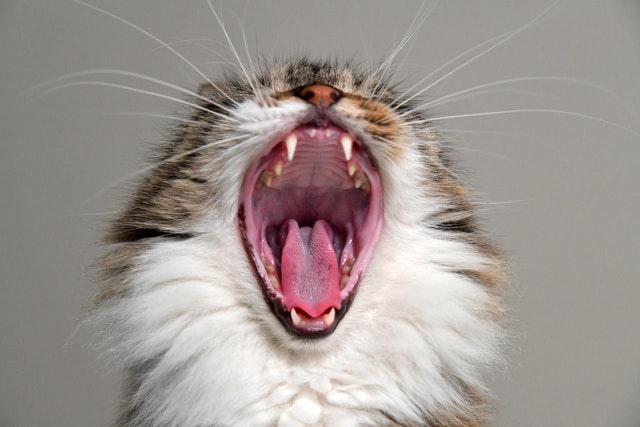July 24, 2022

Pet Dental Health
Did you know that 80% of dogs and 70% of cats show signs of gum disease by the time they are 3 years old? Can you imagine what would happen to your teeth if you didn’t take care of them? The health of your pet’s teeth and gums are important to their wellbeing. Dental disease can cause pain and can allow bacteria to enter and spread throughout the body. This can damage vital organs like the kidneys and heart. Pet’s need regular dental care to stay healthy, just like we do.
What do Veterinarians do for my pet’s teeth?
Veterinary dentistry includes examining your pet’s mouth, cleaning your pet’s teeth, taking intraoral radiographs, and repairing or extracting diseased teeth. Your pets teeth should be checked by your veterinarian at least once a year or sooner if they have:
- Bad Breath
- Broken, loose or discolored teeth
- Extra or double teeth
- Teeth covered in tartar
- Red or inflamed gums
- Abnormal chewing, drooling or dropping food
- Reduced appetite
- Pain in or around the mouth
- Pawing or rubbing at the mouth
- Bleeding from the mouth
- Swelling of the mouth or face
Some pets can be irritable when they have dental problems and changes in behavior should prompt a vet visit. Always be careful when examining your pet’s mouth. A painful animal may bite.
Why is anesthesia required to clean my pet’s teeth?
Let’s face it, most humans don’t love going to the dentist. But we do it because we know it is good for us. Our pet’s don’t understand that teeth cleaning is beneficial for them, they just know they would rather we stay out of their mouth. Anesthesia helps veterinarians and veterinary technicians see all parts of your pet’s mouth, including the inside and outside of all of their teeth, even the ones way back in their mouth. It also reduces fear and discomfort for your pet. And it keeps them still for their xrays so that we can get good clear images.
Anesthesia can be scary to consider and it will always have risks. But veterinarians have tools to make pet anesthesia safer now than ever so that the risks are very low and are far outweighed by the benefits. Steps like pre-anesthetic blood work, safer drugs and careful monitoring help to ensure a smooth procedure and swift recovery.
What can I do at home to take care of my pet’s teeth?
It is never too late to start at home care for your pet’s teeth! Though starting when they are young or after they have had a professional teeth cleaning gives you a “clean slate” to work with. Daily brushing it the most effective way to care for teeth. If you can’t brush every day, then 2-3 times a week is still helpful. Intermittent brushing or once monthly brushing are not going to achieve the desired effect. Most animals can learn to tolerate having their teeth brushed, though cats can be tougher to convince than dogs! Remember to use pet toothpaste, human toothpaste is not good for your pet. Here is a video with some tips on how to teach your pet about toothbrushing.
Other things that can help your pet’s oral health are dental treats, dental chews or dental diets. There are many on the market and not all are created equal. Here is a link to the Veterinary Oral Health Council’s list of accepted products:
http://www.vohc.org/all_accepted_products.html
If you are interested in having your pet’s teeth evaluated or if you have questions about pet dentistry, please contact our office. We would love to help you keep your pet’s mouth healthy!